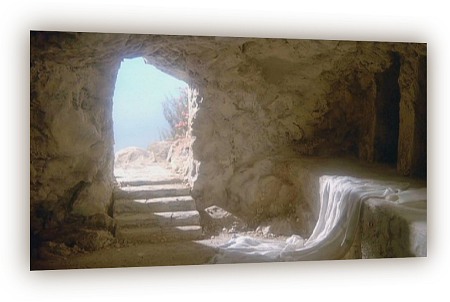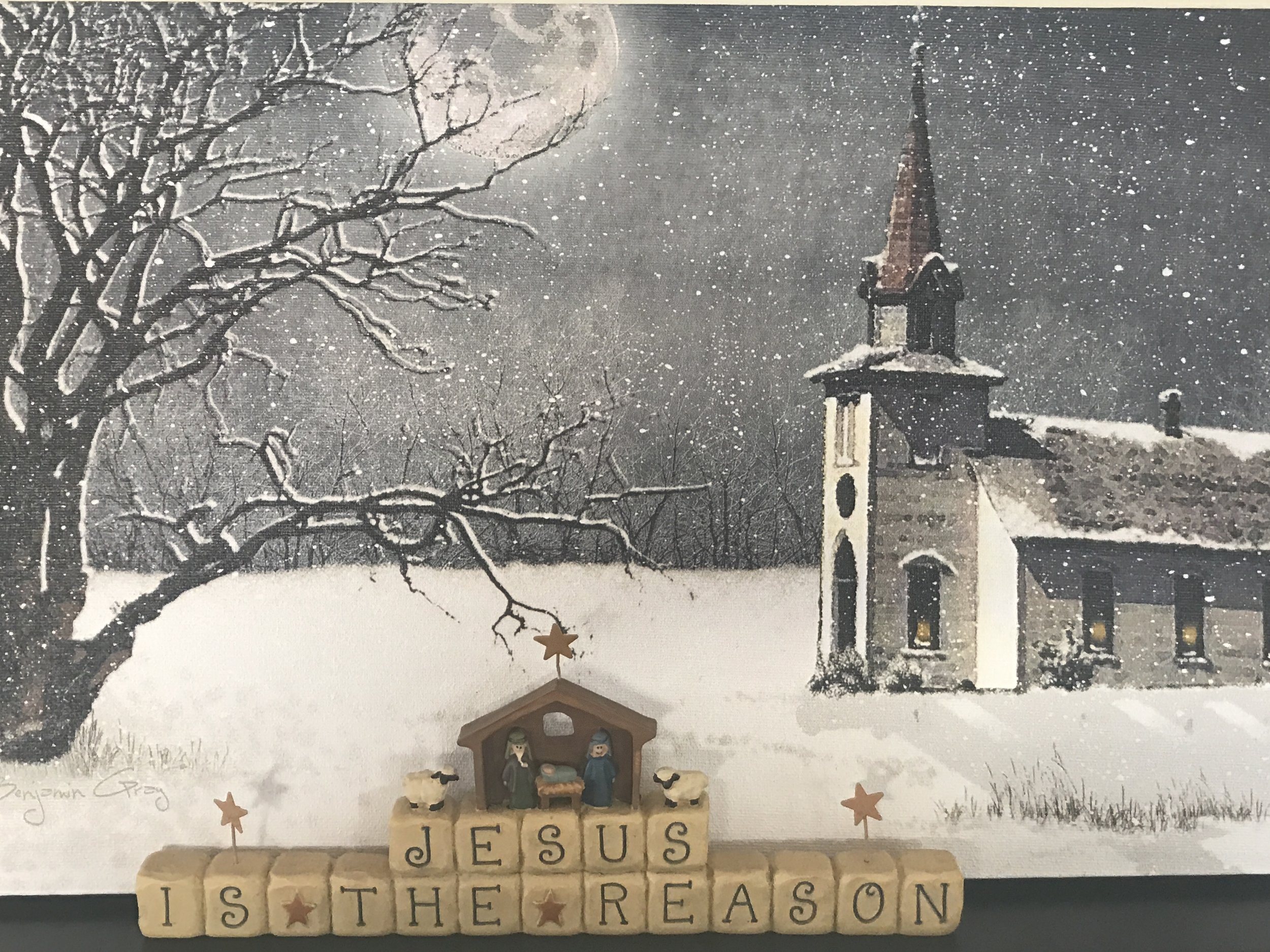Bible Pic2
Do you remember the EF Hutton commercials from several decades ago? In the midst of a loud and boisterous party someone uttered these words, “EF Hutton says. . . .” Instantly the noisy room became quiet as everyone leaned toward the person speaking to hear the latest investment advice from the corporate giant.
The commercials no longer appear on our television screen. As the result of a check kiting scandal, EF Hutton dissolved into other companies and no longer exists.
Jesus and His words, however, endure. In Matthew 24:35 He said, “Heaven and earth will pass away, but my words will not pass away.” Can you imagine any other man or woman making such an incredibly bold and hefty claim? His resurrection proves that this is not the ranting of a lunatic, but the very words of God in the flesh! The words of our Lord will endure forever and ever! That's what He said.
In terms of relative value, can you see how the words of Jesus exceed anything else we might hear? I am not doubting the value of sound investment advice, but there's eternal value in listening when Jesus speaks. His words impart life.
In recent posts, I have examined how the words of Jesus authenticate the book of Genesis as well as the entire Old Testament. What about the New Testament, you might ask? Did our Savior give us any indication as to how He intended to continue speaking to His followers after He ascended back to heaven? Yes, He did!
Jesus Speaks Through the Gospels
In John 14:26 Jesus said, “But the Helper, the Holy Spirit, whom the Father will send in my name, he will teach you all things and bring to your remembrance all that I have said to you.” Here we have Jesus’ promise that the Holy Spirit would supernaturally aid the memory of the disciples regarding what Jesus taught them during His ministry. Let’s look at how this played out.
It began with the devotion of the church to the teachings of the apostles (Acts 2:42). This no doubt included the words of Jesus and all He did in their presence. For an unspecified length of time they remained together in Jerusalem proclaiming Jesus’ resurrection, telling people about His life and teachings, and through the Holy Spirit gaining a greater understanding of the Gospel they preached.
As they realized that Jesus was not returning immediately, they wrote done the words and actions of the Savior they had witnessed.
Matthew wrote his Gospel to show his fellow Jews how Jesus fulfilled the Old Testament prophecies of their long awaited Messiah. Mark wrote down the Holy Spirit aided memories of Peter and perhaps added some of the things he personally witnessed during Jesus’ last week in Jerusalem.
Luke was not an apostle, but wrote his Gospel based on eyewitness accounts including that of Mary herself as we see in his story of Jesus’ birth. I favor the idea of one of my professors at Talbot Seminary who believes Luke did his research during the two years that Paul was in prison in Caesarea. He used that time to consult with the apostles in Jerusalem and others who had witnessed the life of Jesus. The Holy Spirit guided Luke as he talked with the many eyewitnesses of the Savior’s birth, life, death, and resurrection.
Later, John wrote his Gospel to persuade people to believe that Jesus was truly the Son of God in the flesh. We can imagine that as he looked at the other three Gospels, the Holy Spirit reminded him of several incidents they did not include and prompted him to add his perspective to what they did include in their accounts.
Jesus Speaks Through His Apostles
The Lord also spoke concerning the rest of the New Testament that the apostles would start writing about twenty years after His resurrection. In John 16:12-13 he said this, “I still have many things to say to you, but you cannot bear them now. When the Spirit of truth comes, he will guide you into all the truth, for he will not speak on his own authority, but whatever he hears he will speak, and he will declare to you the things that are to come.”
At the time, Jesus’ disciples had trouble grasping His predictions regarding His death and resurrection. How could they possibly have understood the deeper meaning of the cross or the truths regarding justification by faith? They could not possibly have grasped the teachings of Paul in the book of Romans, but later as they came to grips with how Jesus fulfilled the Old Testament and what the cross meant regarding their salvation, they were ready for the Spirit to reveal Jesus’ additional words to His followers concerning the wonderful truths of the Gospel and also of His return to take us home to be with Him.
As time went by, the church recognized the writings of the apostles as God’s Word. Peter, before he died, referred to the letters of Paul as “Scripture” (see 2 Pet. 3:15-16). It was never a matter of people at a later date deciding what should be included in the New Testament but rather of the early church recognizing from the beginning the continuing revelation of Jesus through His apostles.
Jesus Still Speaks Today
From Genesis to Revelation, it’s all God’s Word to us in written form. The New Testament does not contradict the Old Testament, but shows the fulfillment and coherent progression of God’s revelation to us. Everything the apostles later wrote fits perfectly with what Jesus taught during His ministry; it all points to Jesus as ultimate sacrifice for our sin, the author and finisher of our salvation, and His glorious return to earth someday. Rather than contradict His teachings, the New Testament gives us further insight and clarity to what He began to reveal about Himself, salvation, and eternity.
The manuscript evidence for the Bible surpasses that of any ten books from antiquity and it isn’t even close.
Much, much more could be written regarding the integrity of Scripture, the authenticity of what we have today because of the manuscripts, and the Bible’s own internal witness to itself as the Word of God. The manuscript evidence for the Bible surpasses that of any ten books from antiquity and it isn’t even close.
Many might regard me as foolish for believing that all of the Old and New Testament is the inspired Word of God and without error in the original manuscripts. Maybe even some reading this post believe it’s absurd to trust the words of Scripture. However, I’m just basing my beliefs on the words of my Savior and Lord. How can I doubt the words of Jesus, the One upon whom I depend to take me to paradise someday?
EF Hutton fell into disgrace and no longer speaks. Jesus, however, still speaks to us through His eternal Word. Hebrews 1:1-2 says this, “Long ago, at many times and in many ways, God spoke to our fathers by the prophets, but in these last days he has spoken to us by his Son, whom he appointed the heir of all things, through whom also he created the world.” Through the words of the New Testament, Jesus still speaks to us today!
Are you still listening? Is the Holy Spirit making His Word come alive in your heart?





 Would Jesus’ teachings fall under the modern day usage of the term Islamophobic?
Would Jesus’ teachings fall under the modern day usage of the term Islamophobic? Since gravity is true, regardless of our ability to jump we always come back to the ground (I return a bit quicker than most since I can't jump very high). If we drop something, it goes down rather than up. If we trip, we fall unless we regain our balance in time. Since gravity exists, certain things naturally flow from that.
Since gravity is true, regardless of our ability to jump we always come back to the ground (I return a bit quicker than most since I can't jump very high). If we drop something, it goes down rather than up. If we trip, we fall unless we regain our balance in time. Since gravity exists, certain things naturally flow from that.
 Recently, we went with friends to see the movie In Our Hands: Battle for Jerusalem. The movie showed the background to and the fight for the city during the Six Day Way in 1967. Perhaps the most striking aspect of the movie was the joy of the soldiers upon reaching the ancient outer wall of the temple.
Recently, we went with friends to see the movie In Our Hands: Battle for Jerusalem. The movie showed the background to and the fight for the city during the Six Day Way in 1967. Perhaps the most striking aspect of the movie was the joy of the soldiers upon reaching the ancient outer wall of the temple. As I read Paul David Tripp’s devotion today about “eternity amnesia,” I was struck by how well his comments help us understand the madness we see around us in the world today and also, sadly, to some degree in the church.
As I read Paul David Tripp’s devotion today about “eternity amnesia,” I was struck by how well his comments help us understand the madness we see around us in the world today and also, sadly, to some degree in the church. As I sat in class the first day, I begin to realize it was not what I expected. I should have dropped the course and signed up for another one. But I delayed in deciding upon an alternative and ended up stuck in the class.
As I sat in class the first day, I begin to realize it was not what I expected. I should have dropped the course and signed up for another one. But I delayed in deciding upon an alternative and ended up stuck in the class. Life in this world so easily takes our eyes off the prize that awaits us in eternity. It’s so easy to become focused on our daily routines and our attempts to get ahead in this world, that we forget about our true and enduring hope.
Life in this world so easily takes our eyes off the prize that awaits us in eternity. It’s so easy to become focused on our daily routines and our attempts to get ahead in this world, that we forget about our true and enduring hope. Fake news: it’s a term we hear every day and probably use ourselves. Whether you come from a liberal or conservative perspective, you likely accuse the other side of taking its cues from fake news.
Fake news: it’s a term we hear every day and probably use ourselves. Whether you come from a liberal or conservative perspective, you likely accuse the other side of taking its cues from fake news. I must confess that I have enjoyed several of the Christmas movies on the Hallmark channel during the past few weeks. My wife and I watched them together; I think we are just romantics at heart.
I must confess that I have enjoyed several of the Christmas movies on the Hallmark channel during the past few weeks. My wife and I watched them together; I think we are just romantics at heart. I was startled by what I saw on my computer screen. It showed 47,444,396 views for the song I was listening to on YouTube. I had never seen such a high number, although other songs may very well have such a number or even exceed that total.
I was startled by what I saw on my computer screen. It showed 47,444,396 views for the song I was listening to on YouTube. I had never seen such a high number, although other songs may very well have such a number or even exceed that total. “Enter his gates with thanksgiving, and his courts with praise! Give thanks to him; bless his name.”
“Enter his gates with thanksgiving, and his courts with praise! Give thanks to him; bless his name.”
 Before settling into my new calling as a writer, my wife Ruth and I decided to take a road trip to celebrate my retirement from a long career as a financial analyst. We greatly looked forward to our trip: to our stay at a bed and breakfast in the mountains near Asheville, North Carolina and then to our time exploring Savannah, Georgia.
Before settling into my new calling as a writer, my wife Ruth and I decided to take a road trip to celebrate my retirement from a long career as a financial analyst. We greatly looked forward to our trip: to our stay at a bed and breakfast in the mountains near Asheville, North Carolina and then to our time exploring Savannah, Georgia. What causes fear in us at times regarding the rapture? Does our apprehension arise from its abrupt nature or its unexpected timing? Does the unknown or the supernatural cause anxiety to rise within us? Perhaps we do not want our dreams for this life to end so soon.
What causes fear in us at times regarding the rapture? Does our apprehension arise from its abrupt nature or its unexpected timing? Does the unknown or the supernatural cause anxiety to rise within us? Perhaps we do not want our dreams for this life to end so soon.